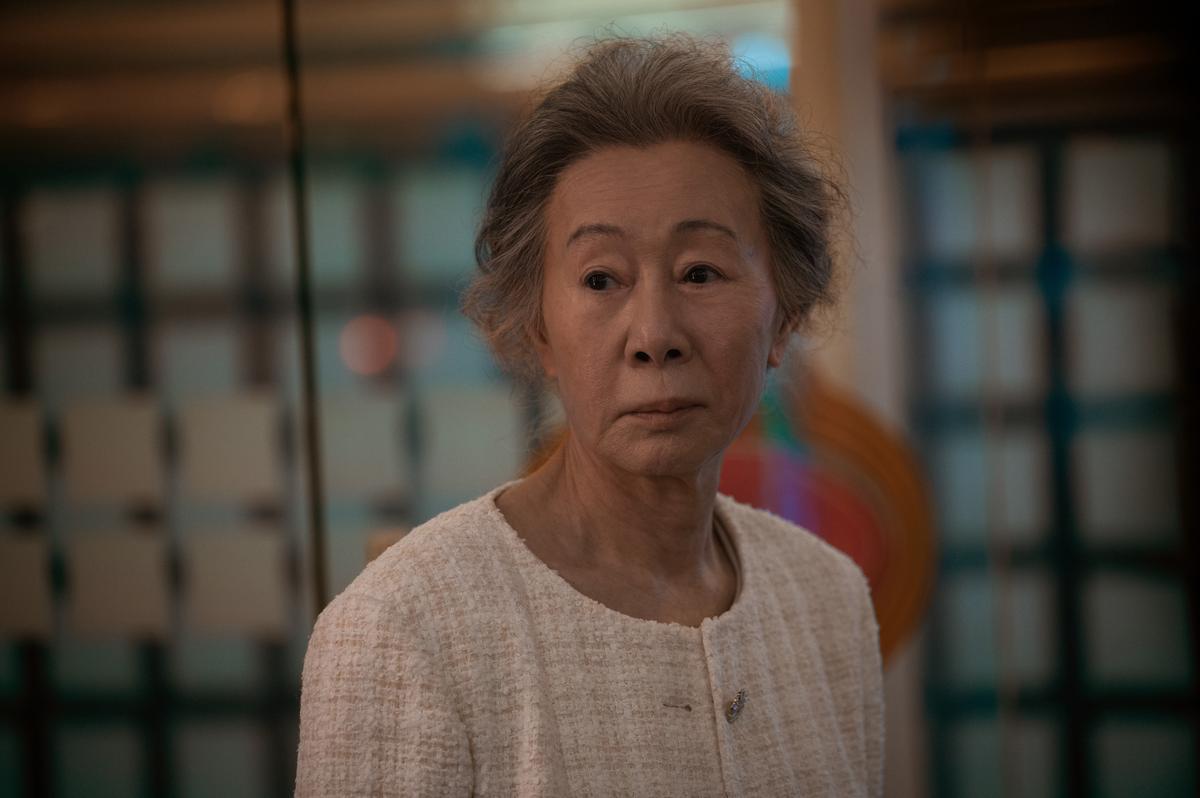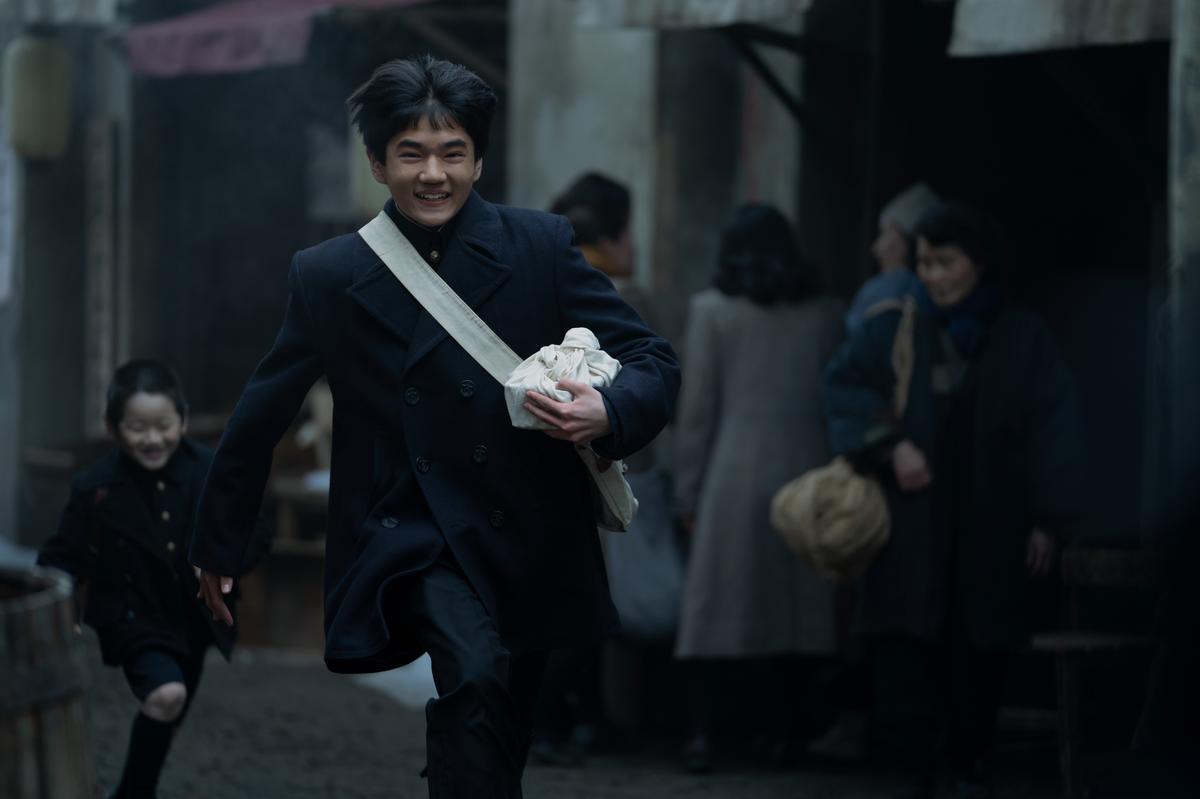
Lee Min Ho and Minha Kim in a still from the show
| Photo Credit: Apple TV +
Early on, in the first episode of season two of Pachinko, American fighter planes drop pamphlets, urging the residents to petition the emperor to ‘halt this brutal war’. The year is 1945 and in Osaka, reminders about the Second World War and an imminent bombing are in every corner. And for Sunja and her small family, this uncertainty and disquiet looms large as well.
ALSO READ: Why Korean epic ‘Pachinko’, starring Lee Min-ho and Kim Min-ha, is timely
Based on the bestselling, acclaimed novel of the same name by Min Jin Lee, Pachinko’s first season premiered in 2022. The eight-episode show deviated from the book’s linear narrative and instead switched between the 1940s chronicling the story of Sunja in Korea and Japan in the World War II era, and 1989 where we follow her grandson Solomon Baek as he returns to Japan from New York for an assignment as a part of his finance job.

If we saw her in season one coming to terms with a sudden pregnancy, and trying to adapt to life in Osaka after leaving Japanese-occupied Korea with her husband, Baek Isak (Steve Sanghyun Noh), Sunja now has a lot more on her shoulders. Years have passed since Isak was imprisoned after trying to help labourers fight for fair wages, her brother-in-law Yoseb (Han Joon-woo) is working in a factory in Nagasaki, and she and her sister-in-law Kyunghee (Jung Eun-chae) are worried about Sunja’s children having to eat worm infested rations. “I am good at selling,” Sunja declares, with steely determination before she sets out to risk her life and sell rice wine in the illegal black market.

Yoon Yuh Jung plays older Sunja, in the 1980s
| Photo Credit:
Apple TV+
All of this is juxtaposed with the late 1980s where Solomon’s father Mozasu (Soji Arai) is gearing up to open a glitzy new Pachinko Parlour. Solomon himself, however, is working on bringing together investors for his new project, having left his old firm at the end of the previous season to bungle up a business deal after being moved by the story of a senior Korean immigrant who refuses to sell her land.

A book as sweeping and expansive as ‘Pachinko’ deserves nothing less than a careful, almost languorous unfolding onscreen – something that was beautifully executed in season one. At a time when the imminent threat of shows not being renewed for newer seasons looms large, Pachinko does not seem to be in any hurry in its new season as well. The first episode is unhurried yet engaging, as it establishes how life has changed for the central characters following a time leap. In Sunja, we see a sense of helplessness, yet there is a determination to provide for her sons, brought alive onscreen by the adept Minha Kim. Her sons Noa and Mozasu, played by Kim Kang-hoon and Eunseong Kwon respectively, are welcome additions to the cast.
Pachinko- Season 2
Showrunner: Soo Hugh
Languages: Korean, Japanese, and English
Cast: Minha Kim, Yoon Yuh Jung, Lee Min-ho, Soji Arai, Jin Ha, Jung Eunchae
Storyline: Four generations of a Korean immigrant family navigate love, loss, grief, and survival in this show based on the bestselling book of the same name by Min Jin Lee
Runtime: 1 hour (per episode)
If Mozasu is sprightly and eager to defeat the enemies (as he declares in a scene where they all practice government-mandated drills to prepare for invaders), Kim Kang-hoon’s Noa is subdued and has the weight of the world on his shoulders as he comes to terms with the discrimination that zainichis (Koreans in Japan) are subject to. As Noa faces his classmates’ taunts about his identity, we have Solomon in 1989, unnerved listening to a Japanese bakery owner’s racially motivated outburst against his grandmother Sunja(Yoon Yuh-Jung). “I’m from Yale University,” he shouts out, in a telling reminder of how much, yet how little has changed for the different generations of the family across decades. As Solomon, Jin Ha effectively embodies a ticking time bomb, constantly on the edge. Desperate now to have a fresh start and pursue his professional ambitions, it will be interesting to see what lies in store for him this season, given that his arc no longer follows the book.

Young Noa and Mozasu from the show
| Photo Credit:
Apple TV+
In season one, the writers chose to flesh out the character of Koh Hansu, a fish broker and merchant with powerful connections whose relationship with Sunja sets off things in motion. Played by actor Lee Min-ho(in a career-best role), we see Hansu’s backstory in a dedicated episode, directed by Kogonada and set against the backdrop of the 1923 Great Kanto Earthquake. Hansu continues to be a looming presence, watching over Sunja and her sons.
Showrunner Soo Hugh has acknowledged many times the universality that a show like Pachinko has – a story that navigates love, loss, grief, and survival spanning generations. Among the show’s biggest strengths is how it has managed to steer clear of becoming an indulgent melodrama, keeping the theatrics to a minimum. The canvas might be vast, and the scale grander than ever before, but Pachinko’s sombre yet affecting storytelling journeys successfully into season 2 with its first episode. This hopefully carries on for the next seven episodes.
Pachinko is currently streaming on Apple TV+ with new episodes releasing every Friday

